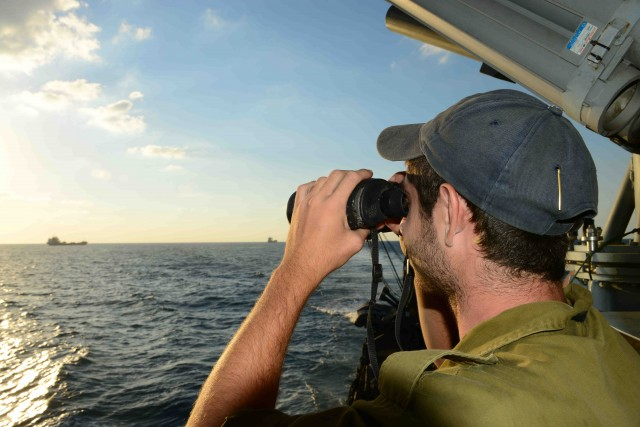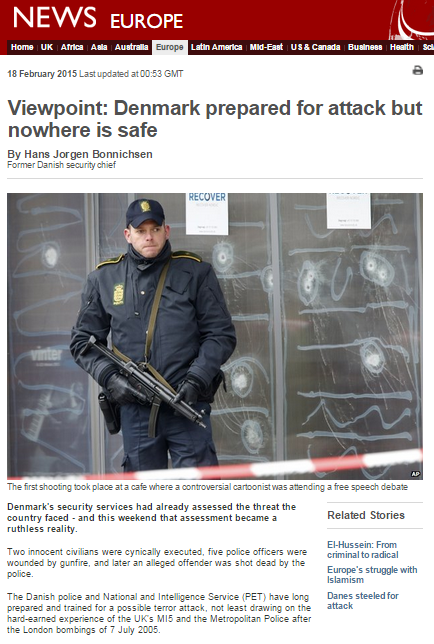This week will mark the 45th anniversary of the Munich Olympics Massacre and the dedication of a new memorial in the city.
This week also marks 45 years of BBC News failure to describe the members of the PLO faction that perpetrated the attack as terrorists.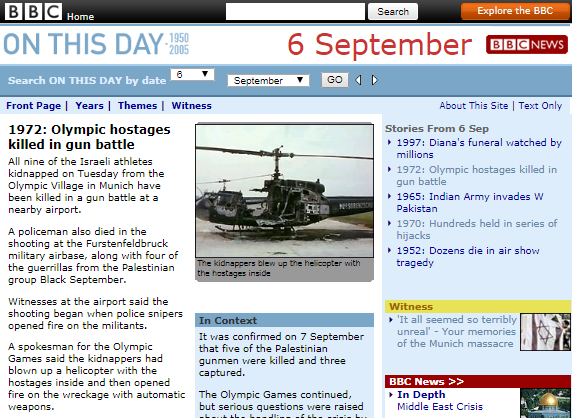
The BBC’s ‘On This Day’ archive includes an item dated September 6th 1972 and titled “Olympic hostages killed in gun battle“. In that report the BBC described the perpetrators as “guerrillas” (despite the fact that their victims were civilians), “militants”, “kidnappers” and “gunmen”- but not terrorists.
That editorial policy continued to dominate BBC News coverage of topics linked to the Munich Olympics attack throughout the years that followed, as seen in the examples below. [all emphasis added]
“Athens 2004 remembers Munich 1972“, August 20th 2004:
“Thirty-two years ago, 11 Israeli athletes were killed at the Munich Olympics, after Palestinian militants stormed the Israeli team headquarters. […]
On 5 September, 1972, eight members of the Palestinian militant group Black September raided the Israeli team headquarters.[…]
Over the next 24 hours, the tense stand-off between gunmen and police was played out in front of television viewers worldwide.
Three helicopters provided by the German authorities took the Israelis and the gunmen to a military airfield outside Munich, supposedly to catch a flight out of Germany.”
“Last Palestinian linked to 1972 Munich massacre dies“, August 18th 2010:
“Two Israelis were killed by the group at the athletes’ village, and nine more died in a botched rescue attempt by the German police. A German policeman and five Palestinian gunmen were also killed.”
“Israeli widow of 1972 Munich Olympics massacre slams IOC“, August 7th 2012:
“Eleven athletes and officials, including Mrs Spitzer’s husband fencing coach Andre Spitzer, died during the attack at the Munich Olympics, after the Black September Palestinian militant group kidnapped Israeli team members. […]
Five Palestinian hostage takers were killed. Others were later killed by Israeli intelligence forces.”
“The Munich massacre remembered“, September 5th 2012:
“The 1972 summer Olympics are mostly remembered for tragedy, rather than sporting achievements. It was there that 11 Israelis were killed after being taken hostage by members of a Palestinian militant group, Black September, on 5 September.
Two died in the athletes’ Olympic village in Munich. The others were killed during a gun battle with West German police at a nearby airfield – as the militants tried to take them out of the country.”
“Germany and Israel mark Munich massacre in ceremonies“, September 5th 2012:
“Wreaths were laid earlier inside the Olympic Village where Palestinian gunmen seized the athletes. […]
On 5 September 1972, eight gunmen burst into the Israeli athletes’ quarters, killing two immediately and taking nine athletes and coaches hostage. […]
During the fighting that followed, the gunmen killed their remaining nine hostages. Five of the gunmen were killed, as was one German policeman.”
“Israeli Mossad spy Mike Harari dies, aged 87“, September 22nd 2014 (discussed here):
“Mike Harari, 87, orchestrated missions including the targeting of militants whom Israel held responsible for the massacre of its Olympics team in 1972. […]
The group had killed two Israeli athletes in the Olympic Village in Munich. Nine others whom they had also taken hostage were killed during a gun battle between the militants and West German police at a nearby airfield. The group was trying to take the hostages out of the country.”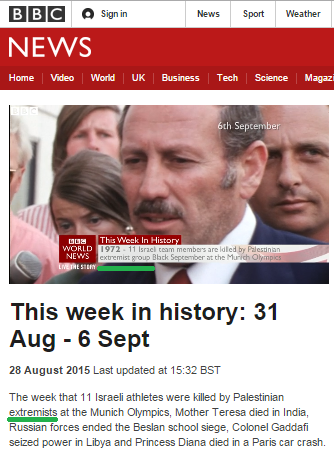
“This week in history: 31 Aug – 6 Sept“, August 28th 2015 (discussed here):
“The week that 11 Israeli athletes were killed by Palestinian extremists at the Munich Olympics…”
“Widow welcomes Munich massacre memorial“, August 2nd 2016:
“The killing of 11 members of the Israeli team at the Munich Games of 1972 remains the darkest chapter in Olympic history.
They died after being taken hostage by Palestinian militants inside the Olympic village.”
“Widow’s wish sees ceremony mark killings of Israeli athletes“, August 3rd 2016: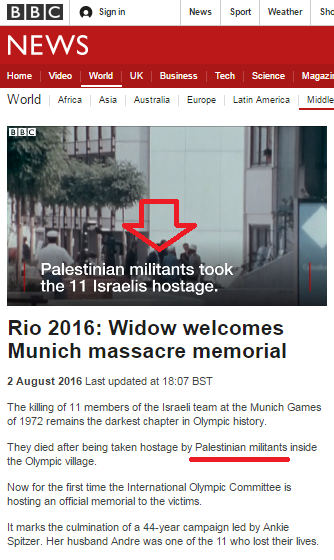
“In the early hours of 5 September, Palestinian militants from the Black September group clambered over security fences at the Olympic Village, made their way to the Israelis’ quarters and took a group of them hostage. […]
The militants, who murdered two of the Israeli athletes, demanded the release of more than 200 Palestinian prisoners in Israeli jails.”
One exception to that editorial policy is found in an article on the BBC Sport website written by the veteran BBC sports reporter Barry Davies in 2012:
“At the Munich 1972 Olympics, Palestinian terrorists calling themselves Black September attacked members of the Israeli Olympic team in their quarters at Block G, 31 Connollystrasse, in the Olympic Village. […]
The terrorists had asked for the release of 234 people from jails in Israel, but Israel would not negotiate. Eventually, there was supposedly an agreement that the group would be flown out of the country and helicopters were brought in. In reality, the Germans’ plan was to ambush the kidnappers.
However, they made a big mistake. They thought there were only five terrorists – but there were eight.”
Another BBC sports journalist – Peter Scrivener – also used accurate language in a blog post written in 2008 which is still available on the BBC Sport website:
“The 1972 Games in Munich were into their second week when, in the early hours of 5 September, Palestinian terrorists gained access to the Olympic village and killed two members of the Israeli team. […]
Negotiations led to the terrorists taking the hostages, by helicopter, to a military airfield at Fürstenfeldbruck, where they believed they would be boarding a plane to Egypt.”
An additional exception to the rule appears in the synopsis to an edition of the BBC World Service radio programme ‘Sporting Witness’ that was broadcast in April 2016.
“Shaul Ladany is a long-distance Israeli race-walker who set world records that stand to this day. But, even more remarkably, he survived a childhood in the Belsen concentration camp and then the terrorist attack on the Israeli team at the Munich Olympics in 1972.”
And when the BBC aired the film ‘One Day in September’ in the year 2000, an accompanying article on the BBC Sport website used appropriate language:
“The world looked on in horror 28 years ago as Israeli athletes were taken hostage by Palestinian terrorists in the Olympic Village. Eleven were murdered. […]
But the picture darkened on 5 September when a group of eight Palestinian terrorists raided the Israeli team headquarters. […]
Over the next 24 hours, the tense stand-off between terrorists and police was played out in front of TV viewers worldwide.”
Notwithstanding those exceptions (and the impression that BBC sports journalists make a better job of using accurate terminology than their counterparts in the news department), the dominant BBC editorial policy over the years has been to refrain from describing the 1972 attack on the Israeli Olympic team as terrorism and its perpetrators as terrorists.
However, in a Radio 4 programme broadcast earlier this year, BBC audiences were told that:
“Terrorism can mean different things to different people; it isn’t black and white. States allegedly resort to it too, as Israel did to avenge the 1972 Munich Olympic Games massacre. Eleven Israeli athletes died following an attack by Palestinians from a shadowy group known as Black September. In revenge, Israel’s intelligence agency, the Mossad, covertly assassinated those suspected of involvement in the attack.”
After forty-five years it is clearly high time for BBC News to ensure that reports relating to the 1972 Munich Olympics Massacre use accurate and consistent terminology which clarifies to audiences that the incident was an act of terror perpetrated by terrorists.
Related Articles:
BBC still won’t call Munich Olympics massacre perpetrators terrorists
BBC Radio 4’s double standards on response to terrorism

